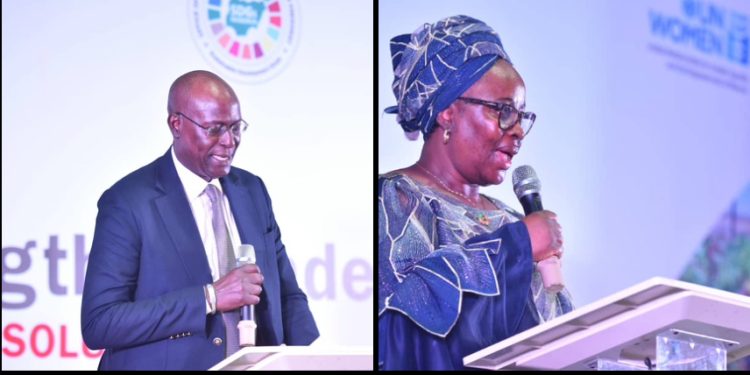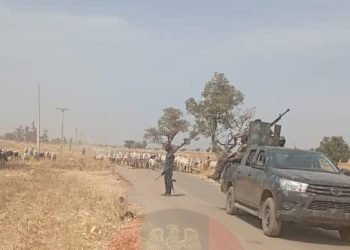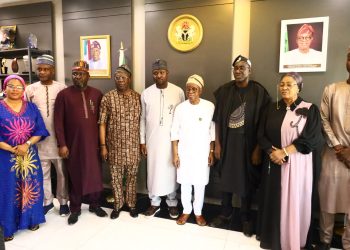By Mnena Iyorkegh, Abuja
The United Nations has urged Nigeria to be strategic and make well-financed commitments to SDG 5. SDG 5 is a critical accelerator for achieving the 2030 Agenda for Sustainable Development.
At a Dialogue on Financing Gender Equality and Women Empowerment in Abuja, Nigeria’s capital, themed “Closing the Gender Gap: Financing Solutions for SDG 5,” the UN lamented that Nigeria is currently off-track on nearly sixty percent of the Sustainable Development Goals (SDGs) indicators, with gender inequality and the marginalization of women and girls being significant barriers to progress.
Speaking at the Dialogue, the UN Resident and Humanitarian Coordinator in Nigeria, Mohammed Fall, emphasized that gender-responsive budgeting is crucial for ensuring adequate financing for the SDGs.

“Gender equality is not just a goal in itself; it is a catalyst for progress across all SDGs. Funding SDG 5 can transform the lives of women and girls by providing access to quality education, healthcare, and economic opportunities. It can reduce gender-based violence through targeted programs and legal reforms, ensuring a safer environment for all. Additionally, increasing women’s participation in leadership and decision-making will enable more inclusive governance, leading to more equitable policies that benefit society as a whole.”
Mr. Fall also stressed the importance of reflecting on the current state of progress towards the SDGs.
“The journey towards achieving the SDGs by 2030 is challenging, but it is not insurmountable. By leveraging the transformative power of SDG 5 and implementing gender-responsive budgeting practices, we can make significant strides in bridging the gender gap and fostering a more equitable, inclusive, and prosperous Nigeria for all,” He added.
He noted that women and girls continue to experience disproportionate levels of poverty, limited access to education and healthcare, and significant barriers to economic participation and decision-making.
“Gender-based violence remains pervasive, affecting nearly one in three women. Women also represent less than 5% of Nigeria’s national parliament, reflecting significant underrepresentation in decision-making processes. Within the UN system, gender equality and the empowerment of women and girls are enshrined in the United Nations Sustainable Development Cooperation Framework (UNSDCF) and cut across all strategic pillars. This underscores the collective commitment to mainstreaming gender perspectives into every aspect of work, ensuring holistic and inclusive efforts”. He noted
UN Women Country Representative to Nigeria and ECOWAS, Ms. Beatrice Eyong, highlighted that the dialogue serves as a platform to explore innovative financing strategies, share best practices, and forge partnerships to drive the implementation of gender-responsive policies and programs. “As we gather here today, we are reminded of the critical importance of SDG 5 in our collective efforts to build a more equitable and inclusive society. Gender equality is not just a fundamental human right but a necessary foundation for a peaceful, prosperous, and sustainable world. While significant strides have been made toward achieving SDG 5, we acknowledge that substantial work remains, particularly in the area of financing. Ensuring adequate and targeted financial resources is crucial to closing the gender gaps that persist across various sectors in Nigeria. Gender-responsive budgeting provides a well-established policy approach to support the increased alignment of public resources with gender equality objectives,” she said.
The Senior Special Assistant to the President on SDGs, Adejoke Orelope-Adefulire, explained that financial flows towards Nigeria’s development have been constrained due to declining government revenues; however, efforts are being made to achieve the desired goals. “The lack of an integrated approach to financing SDGs further aggravates the challenge and poses a threat to meeting the estimated $100 billion financing requirement between 2020 and 2030. To address this financing challenge, Nigeria designed its Integrated National Financing Framework (INFF) in 2022. The INFF serves as a planning and delivery tool to finance sustainable development at the national level. It helps policymakers outline a strategy to increase investments for sustainable development, manage financial and non-financial risks, and ultimately achieve sustainable development priorities. While a country’s national development plan outlines what needs to be financed, the INFF shows how it will be financed and implemented. Implementing the INFF for sustainable development in Nigeria will enable an integrated approach to leveraging diverse opportunities to mobilize resources required for financing the SDGs in Nigeria.”
According to reports, as of 2021, the total investment requirement for Nigeria’s National Development Plan (2021-2025) was estimated at N348.1 trillion, with the public sector expected to commit N49.7 trillion and the organized private sector expected to finance the balance of N298.3 trillion.
Stakeholders emphasized the need for robust monitoring and evaluation as the 2030 deadline for meeting the SDGs approaches.
The Dialogue was organized by UN Women and the Nigerian government.















